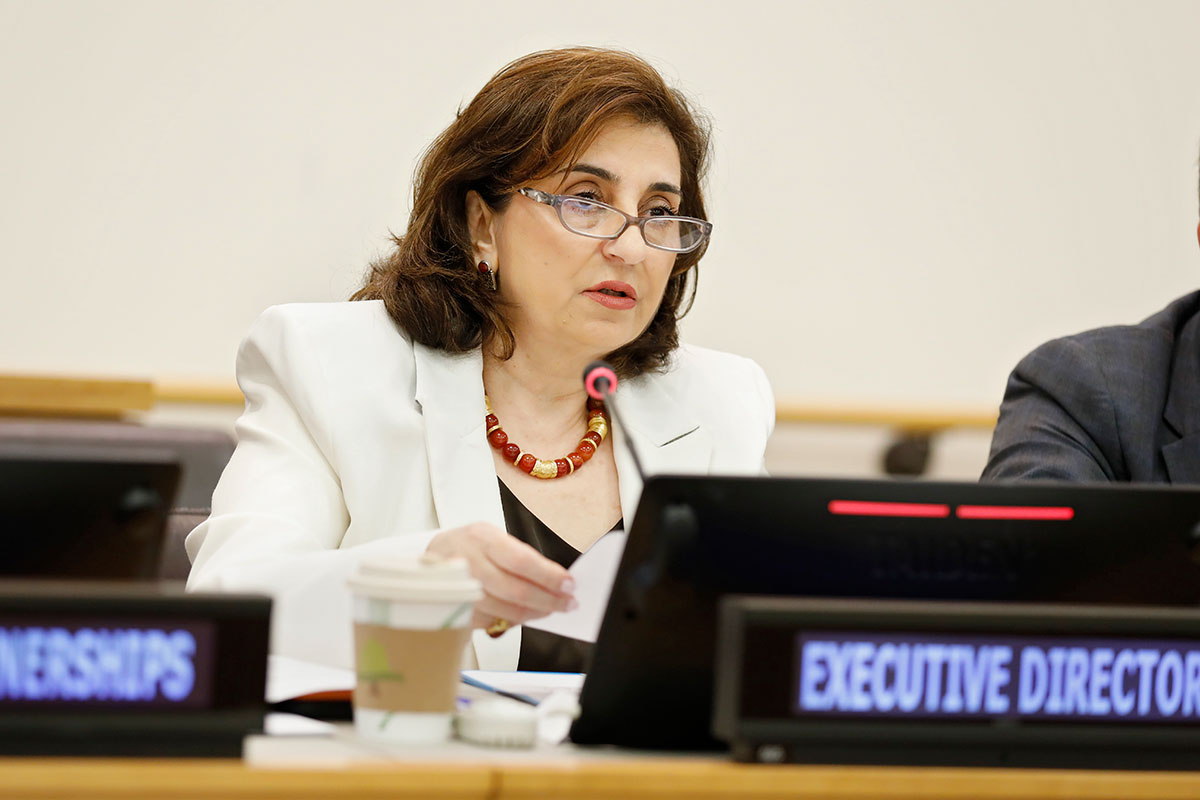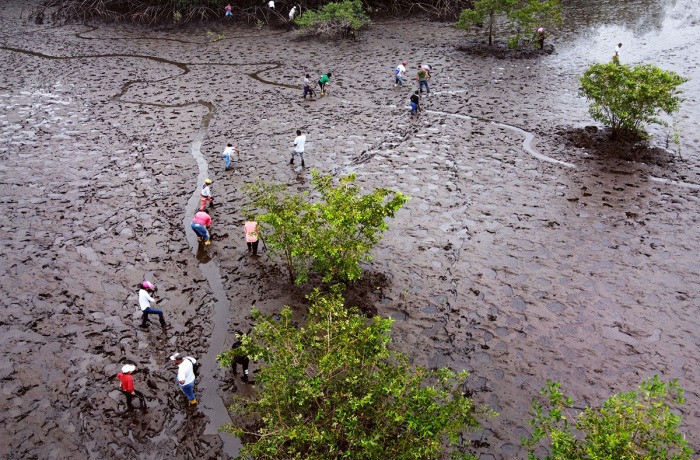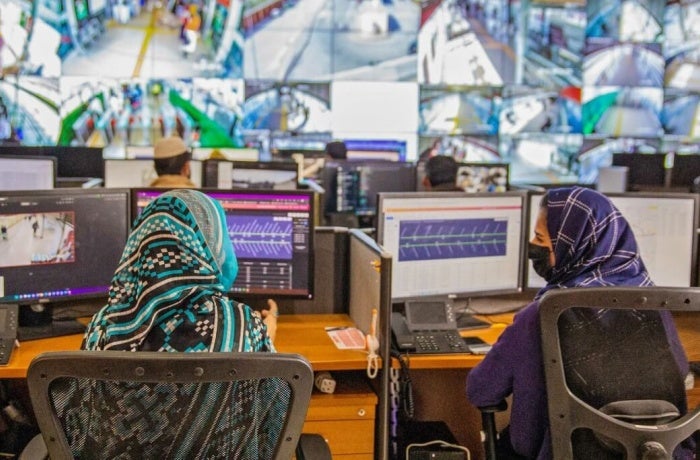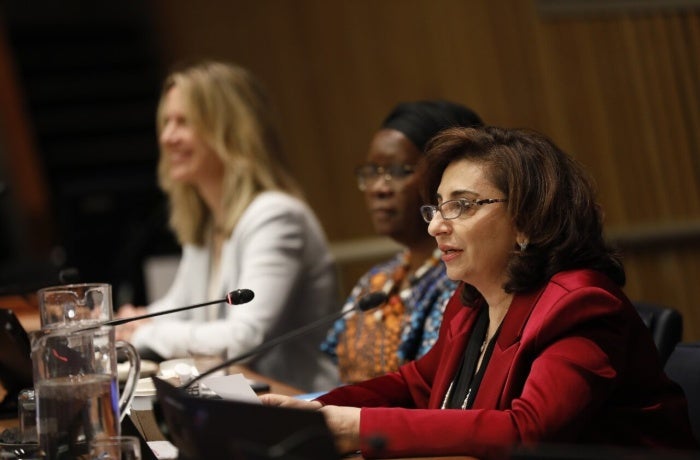Speech: Gender equality – prerequisite and catalyst for progress
Opening statement of UN Women Executive Director Sima Bahous to the Annual Session of the Executive Board, 19 June 2023
[As delivered]
Good morning and welcome to our Annual Session of the Executive Board of 2023.
My sincere thanks to H.E. Mr. Sergiy Kyslytsya, Ambassador and Permanent Representative of Ukraine for your able Presidency and strong support to UN Women. My sincere thanks also to our Vice-Presidents, H.E. Ms. Leonor Zalabata Torres, Ambassador and Permanent Representative of Colombia; H.E. Mr. Maurizio Massari, Ambassador and Permanent Representative of Italy; H.E. Mr. Suriya Chindawongse, Ambassador and Permanent Representative of Thailand; as well as Ms. Nelly Banaken Elel, First Counsellor at the Permanent Mission of the Republic of Cameroon.

Every time we meet in this Board, we share our concern at the global state of gender equality. We do so today against a backdrop of deepening inequality, economic instability, the deterioration of global peace and security including in Afghanistan, Ukraine, and Sudan among many others, we also look at rising food insecurity, climate change and more.
As the Secretary-General persistently reminds us, the 2030 Agenda is off-track. We must do something different. This is equally true of the challenges around SDG 5. They are daunting. But at the same time, we all appreciate and understand that gender equality remains our best hope to bring all SDGs back on track. It is both prerequisite and catalyst for progress across the goals, bringing dividends in every space. However much it may cost to achieve those dividends, it is vastly more expensive to spurn them.
You established UN Women in part to reposition the UN system, to work in a new way that leverages the powerful complementarity of normative, coordination and operational elements in our mandate.
We all feel the weight, the opportunity, and the responsibility of that mandate more acutely than ever. This is why we are actively engaging in the Gender Review process as part of Our Common Agenda and as an opportunity for the UN as a whole to deliver better and more coherently for women and girls. We are working with our UN system partners on the next steps of the review, and welcome the process as an opportunity to strengthen the criticality and interconnectedness of our triple mandate.
Before we go further and review our 2022 results, allow me to take the opportunity to thank Asa Regner and Anita Bhatia, my two colleagues, for their service as Deputy Executive Directors and also my thanks to Sarah Hendriks and Moez Doraid for serving as Deputy Executive Directors ad interim, including at this Board. I believe you know them both well and share my confidence in their able handling of the briefs while we recruit these positions permanently, a process that is already well underway. I thank you in advance for extending to them your usual cooperation.
With that, I am proud to share the 2022 Annual Report with you. Of the many results it presents I would like to highlight two areas which show how we leverage our normative, coordination and operational roles, in line with resolution 64/289, to achieve results.
UN Women has been rapidly stepping up our coordination in crises, something I consider to be a priority for our mandate. This was not an area our predecessor entities were strongly capacitated for. We have therefore worked hard to build capacity, particularly over the last 10 years or so, to make a contribution in crisis contexts where women and girls need the UN the most.
As in all areas, we leverage the complementarity of our triple mandate through our work on the normative, coordination and operational levels.
In 2022, we supported the formulation and implementation of global, regional, and national policies and standards as part of crisis response and recovery efforts, for example in disaster-risk reduction.
In our new role as member of the Inter-Agency Standing Committee, we are leading the update of its Gender Policy to ensure clarity of principles, standards and designated roles and responsibilities within humanitarian action. As Co-Chair of the IASC’s Gender Reference Group, we promoted accountability for delivering on that policy across 31 crisis contexts.
In line with the coordination aspect of our mandate, in 2022 we brought those principles and standards to humanitarian and refugee coordination mechanisms in over 40 country and regional contexts. As a result, 87 per cent of the Humanitarian Response Plans that we engaged with incorporated gender equality outcomes.
We also supported programmes that demonstrate the transformative impact of women’s empowerment in crisis, providing services in 2022 to over 800,000 crisis-affected women and girls, including refugees, internally displaced persons, and returnees.
In the area of ending violence against women, we worked in 2022 with some 900 national and sub-national governments, civil society organizations and private institutions to strengthen the provision of essential services, goods and resources. Almost 3 million women across 20 countries gained access to information, goods, resources and services through UN-Women-supported platforms and programmes.
These operational activities made real for women the global normative frameworks and guidance on ending violence against women, including the Agreed Conclusions of the Commission on the Status of Women.
These activities also leveraged our coordination role, notably through the Spotlight Initiative and the UN Trust Fund to End Violence Against Women. Together with the Women’s Peace and Humanitarian Fund, they were vital vehicles to support the crucial role of civil society, with nearly 60 million dollars disbursed and over 140 global initiatives launched to support women’s rights organizations, and for youth and adolescent leadership.
This is the triple mandate you gave us, delivering results with impact. It is the right way for us to support the 2030 Agenda and the pursuit of SDG 5. And it will remain the essential driver of our approach for the remainder of our Strategic Plan period and beyond.
I have made our presence at the heart of the UN system one of my priorities. Our coordination mandate is not only about leading, but also about adding value alongside others. We are walking our talk, with 30 per cent of our expenditure in 2022 going through joint programmes. This is double since 2018 and exceeds the Strategic Plan target. And I would like us to go further.
Working closely with our colleagues at DCO, now half of the UN Sustainable Development Cooperation Frameworks developed in 2022 have a stand-alone gender equality outcome. Three-fifths mainstreamed gender across outcomes.
In 2022, we helped pooled funds to incorporate gender markers so as to increase funding for gender equality.
We led inter-agency efforts to mainstream gender analysis in the 2022 Financing for Sustainable Development Report and supported Member States to integrate gender equality in global norms on financing for development. As a result, Member States at the 2022 Financing for Development Forum committed to ‘massively scale up efforts’ to achieve gender equality and the empowerment of all women and girls. To further this, we provided high-quality technical support in 64 countries for mainstreaming gender equality in fiscal policies, plans and budgets, driving gender-responsive financing strategies, and allocating public resources for national gender equality commitments.
Whether in preparations for the SDG Summit, Financing for Development, the Summit for the Future, the realization of Our Common Agenda, or in the daily collaboration with our ever-growing network of partners, we are ensuring the centrality of gender equality.
In every space where the UN considers its work and its future you can rely on our presence to ensure the system delivers. That is what being at the heart of the UN system means and it is what we will continue to do.
We look forward to doing this also at the Midpoint Moment of Generation Equality, here in New York in September. It will be an opportunity for all the Generation Equality partners to come together to renew their commitment to accelerate progress on gender equality.
In this Annual Session we will look at how we seek to ensure effectiveness and efficiency as a foundation. Doing so transparently and rigorously have been priorities during my leadership. From the financial review to the strengthened ethics office, to the launch of our new Transparency Portal, which allows anyone to interrogate our results and resources data including for 2022, UN Women is improving and embracing our accountability to you, our broader stakeholders and to everyone.
We have strengthened governance, risk management, and compliance as detailed in the Internal Audit Service’s Report, including through new processes such as the Business Review Committee and Quarterly Business Review. We met 100 per cent of the milestones relating to the implementation of internal and external audit recommendations, with one of the highest implementation rates in the UN system.
These highly-functional operational structures drove 2022 delivery rates of 97.1 per cent on regular resources and 86.1 per cent on other resources.
However, as we discussed in the informal briefing last week, addressing our accumulated unspent balances is a priority, as is ensuring that we have more effective financial foresight. I have instructed that we spend these funds swiftly but wisely, prioritizing crisis response and organizational strengthening in line with the Strategic Plan, and doing so in a way that hardwires better budgeting going forward.
We will hear in this session from our Independent Evaluation and Audit Service, with whom we work to continuously improve. I look forward in that regard to the consideration of the evaluation of our contribution to women’s economic empowerment by advancing gender-responsive laws, frameworks, policies and partnerships.
As always, I anticipate with pleasure our usual open and frank exchange of views. Your guidance and partnership remain our single greatest asset. I am sure we will make the most of our precious time together during this session.
The spirit and energy of this Board for gender equality is, and has always been, exemplary. It is incumbent on all of us to extend that strength to other spaces where we have influence and voice.
So allow me to ask two things of you: first, I ask that you ensure the centrality of gender equality and women’s rights in every intergovernmental space as robustly as you do here. I think in particular of the upcoming SDG Summit, the Ministerial deliberations for the Summit of the Future, the High Level Dialogue on Financing for Development, and the final Political Declaration for the upcoming SDG Summit, which are high on all our agendas.
Second, I ask that you continue to carry the messages of our Board to all the governing bodies of our sister entities, for example by encouraging their application of the recently approved UN system data standards on the Gender Markers in their financial reporting. Mainstreaming gender across the UN system is UN Women’s mandate but our shared endeavour.
I am confident that these three days will deliver the benefits of our honest relationship, our shared commitment to and belief in the triple mandate of UN Women, and our determination to make SDG 5 the most potent accelerator of the 2030 Agenda.
I thank you for your trust and wish us all a productive Annual Session.








